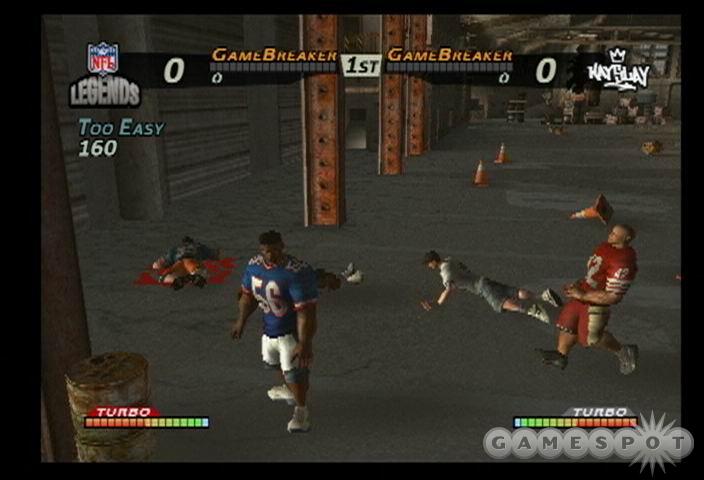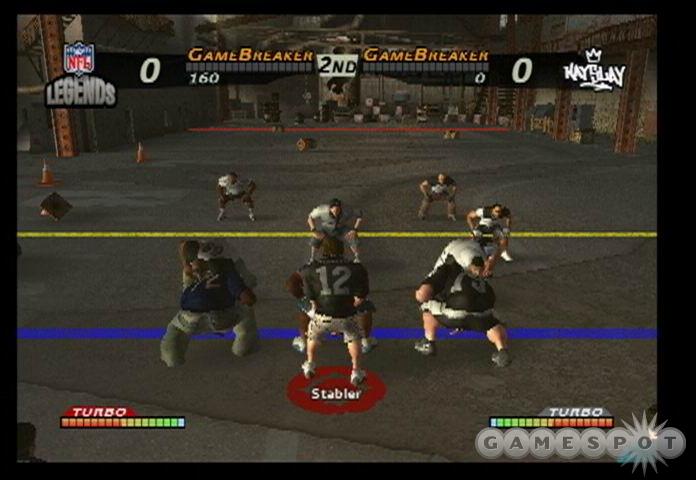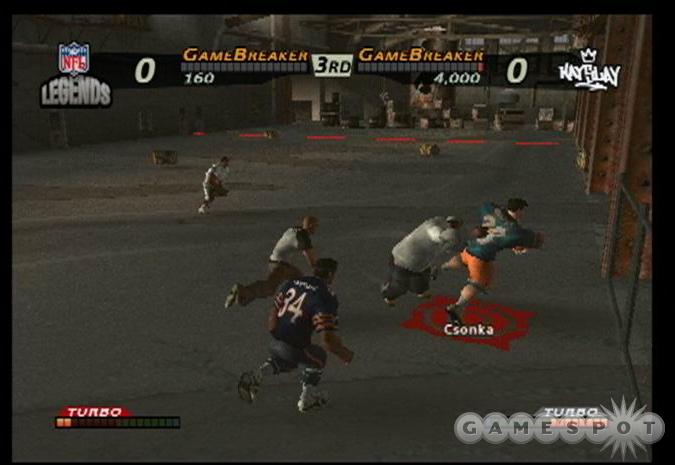With Midway having recently taken NFL Blitz away from its arcade roots in favor of a more simulation-based direction, there has been a gaping hole in the arcade football genre--one that EA Sports is now more than happy to fill with the newest addition to its arcade sports lineup, NFL Street. Developed by longtime Madden NFL Football house EA Tiburon, NFL Street borrows numerous core elements from EA's other Street franchise, NBA Street, and attempts to implement them into the game of football. Considering the success EA has enjoyed with the NBA Street franchise, it seemed only natural that at some point the company might get it in its head that branching the Street name out into other professional sports could prove interesting. However, this fact seems all too obvious at times when playing NFL Street, because in some ways the game feels more like a marketing maneuver than a legitimate football game. Still, on the whole, NFL Street can be quite fun, and if you're a fan of arcade football, you'll certainly find things to like about it.

At its core, NFL Street is a seven-on-seven game of football, much like Midway's old Blitz titles. However, beyond this basic comparison, there actually isn't much about Street that can be compared to Midway's NFL games, because the two play much differently in most every way. For starters, games in NFL Street take place outside of real football arenas, occurring instead in various urban locations scattered throughout the country. As such, EA Tiburon has taken some liberties with the basic rules of football to compensate. Downs are measured by specific down markers spread 10 yards apart across the playing field. So, for example, if you run for a first down but also gain an extra two yards past the down marker, you'll actually accrue that yardage on the next set, so you'll start at 1st and 8, rather than 1st and 10. Additionally, extra point conversions after touchdowns are handled differently, since there's no kicking game in NFL Street at all. You'll start a few yards out from the end zone, and by running the ball in, you can gain one point, or by passing it in, you'll get a two-point conversion. Because there is no time clock, the winner of the game is based on a set winning score determined at the beginning of the game, so, depending on what you set the winning total to be, you'll have to strategically pick your point conversions throughout the game to come out on top of your opponent.
Since you'll actually have only seven players total on your team at any given time, players have to play both offense and defense, which makes picking your players an interesting challenge in itself. Every player in the game has specific stats in the categories of passing, speed, blocking, agility, catching, run power, carrying, tackling, coverage, and defensive moves. The key is to pick a balanced roster, though if you want a team that is especially proficient at, say, pass defense, you may want to load up on defensive backs and linebackers that excel in the coverage category. Or, if you want to have a team that runs the ball especially well, get a tough running back and some solid blockers for your O-line. This method of player selection is sort of a neat nod to playground-style football, and in the context of the game, it works well.
NFL Street's gameplay is arcade through and through, focusing heavily on fast-paced action and frequent turnovers, without worrying about silly little things like penalties or injuries. Whether you're running or passing the ball, much of your success weighs on your ability to master the game's moves system. Offensively, players can juke, spin, jump, or power their way past defensive players, as well as pitch the ball away to a teammate. The pitch function is probably the most useful move available when you're in possession of the ball, since the game is set up in such a way that performing this move will allow you to theoretically keep a play going for as long as is necessary to make your way to the end zone. When on defense, you can try to rip the ball away, catch and deflect passes, dive tackle, or try to weave your way past blockers. There is also a turbo button that gives your controlled player a solid burst of speed when needed, on either side of the ball. All of these mechanics are pretty rudimentary for any football game, but they're set up in an appropriately exaggerated fashion, so tackles are much more ridiculously hard hitting, jukes and fake-outs are similarly crazy, and turnovers are incredibly frequent, to the point where fumbles and interceptions are almost an inevitability. However, two elements more than anything else in the game set NFL Street apart from your average football game: style moves and gamebreakers.
Style moves are essentially the spiritual counterparts to NBA Street's ultrastylish dunking maneuvers. When possessing the ball, you have the option to press the style button to perform a taunt move while moving the ball. These stylish taunts let you juggle the ball in the air, spin it on one finger, or pull off some unique dance moves when running, and when passing, you can also do some nifty no-look or behind-the-back passes. The downside to style moves is that when executing them, you're much more prone to fumbling while running, and passing is much harder when doing a style pass--the upside, however, is that doing these types of moves earns you style points, which, in turn, increase your gamebreaker meter.

When a team fills up its gamebreaker meter, pressing a button will enact the gamebreaker, which, in effect, makes your team near unstoppable for a full possession. Gamebreakers may be executed when you're on offense or defense and are equally effective on either side of the ball. On offense, it becomes near impossible for the other team to stop you from scoring; on defense, your team will become incredibly strong, able to force a turnover on most plays. Gamebreakers are an interesting wild card, and managing them adds a bit more strategy to the game. Unfortunately, the style moves themselves don't fare as well. While the taunts are amusing the first couple of times you see them, that's about all you'll get out of them. They just aren't anywhere near as interesting as they could be, and in actuality, they present a perfect example of one of NFL Street's biggest problems--its contrived sense of style.
Much of NFL Street's perceived style is derived from the basic urban, hip-hop-themed style that NBA Street created, but in an NFL setting, it just doesn't seem to work quite as well. Essentially, the game's methodology for making the players of the NFL more "street" is to give them baggy clothes and maybe a visor or a backward baseball cap and have them trash-talk one another with some pretty silly dialogue. Everything, right down to the names for some of the style point moves, like "movin' da chains" and "bring tha noise," and some of the game's unlockable teams, which feature artists from the game's soundtrack, like the X-ecutioners and DJ KaySlay (along with some other NFL players who are already available on their respective teams), seems like a rather forced attempt to cram a little more feigned flavor into the mix. Though none of this is really all that different from what NBA Street has done over the years, something about the way NFL Street puts it all together just feels rather disingenuous by comparison.
Thankfully, there's also a pretty good roster of game modes to choose from in NFL Street, though not all of them work as well as they could. From a single-player standpoint, NFL Street's main mode is NFL challenge. In this mode, you are provided a generic team of scrub, no-name players, and your task is to travel across the country, pitting them against the NFL's elite. Each region is broken up into the NFL divisions, and each division has its own specific set of challenges and a ladder tournament associated with it. You'll need a variety of different skills to complete the challenges. Some challenges are as simple as scoring before another team does or acquiring a set number of style points, whereas others are decidedly tougher, like recording a certain number of sacks or successful jukes in a game while at the same time beating the opposing team. There are eight challenges in each division, and by completing them, you can earn tokens to enter into new challenges in other divisions, and you can earn development points, which you may use to customize your team's appearance, physical stats, and particular skills. You can also edit your players' names, faces, hairstyles, and such, but those attributes don't cost points. In the ladder tournaments, you simply go through and try to beat every team and then play against an all-star team at the end of the division. Completing divisions lets you unlock bonus teams and previously locked divisions. At any point you can also use your NFL challenge team in the game's remaining modes.

While the NFL challenge mode is certainly deep and sometimes entertaining, it can be a bit much. Most challenges don't take very long to complete, but some of the tougher ones can take a number of tries through, as you might expect. Also, a typical game in NFL Street takes around 10 to 15 minutes. Add together all of the ladder matches and challenges, and you're looking at around at least 10 hours of work. This would be fine, except that playing against the computer-controlled teams, even at the game's hardest difficulty, ceases to be challenging after a few hours of playing. Once you've mastered the concept of the outside run and upgraded your team's quarterback and receivers to a proficient level, it becomes a pretty basic task to blast through your opponents, since the AI isn't quite as multidimensional as it perhaps should be. Sure, turnovers still happen frequently, but once you have a handle on how to manage your defense and force turnovers yourself, this becomes a nonfactor. That leaves the challenges, which, like playing against the computer, cease to be particularly interesting once you've grasped the ins and outs of the gameplay.
Despite NFL Street's single-player woes, the game does work much, much better in a multiplayer capacity. NFL Street's remaining modes include a quick game, where you simply play a game against any of the game's available teams, and a pickup game, in which you are given a pool of 40 randomly selected players from the game from which to choose your team's roster. As with the NFL challenge mode, when you're playing alone, these modes aren't very interesting for very long. However, when you're playing with friends, these modes become instantly better. The pickup game mode is especially fun against other players, as even the process of player selection can get pretty competitive. In-game, the action is a lot less predictable when you're going against your friends, which makes the whole experience much more entertaining. Additionally, each of these modes can be played in the PS2 version's online mode, and there's a feature that lets you take your created team from the NFL challenge mode and pit it against other players' created teams. This is a very cool feature that definitely adds to the scope of the NFL challenge mode, if only in the PS2 version of the game. All in all, the online mode performs well over standard consumer-grade broadband, with only minimal bouts of lag here and there.
From a graphical standpoint, although NFL Street's style doesn't really work in most respects, that doesn't mean the game doesn't look good. Aside from the slightly silly costuming, all the game's player models look really great. Built in a similar, exaggeratedly goofy fashion as the player models in the NBA Street games, the players look surprisingly accurate and, overall, nicely designed. Additionally, NFL Street's animation is top-notch. Tackles, slams, catches, and runs--all of it flows together near seamlessly, which adds a lot of excitement to the action. Many of the tackles and hits look brutal, especially some of the game's awesome-looking wall slams. There are eight playing fields available in NFL Street, ranging from EA's own northern California campus, to a rooftop somewhere in Atlanta, to a beach along the picturesque Pacific coast, to a vacated warehouse. Each field has its own range of interactive elements, like oil drums scattered throughout the warehouse field and beach balls that float around through the beach stage. These are certainly a nice touch, but aside from these elements, there really isn't anything specifically interesting about each field. Ultimately, they're merely serviceable for what the game requires, and not much else. Comparing the three versions of the game, predictably the GameCube version looks just a bit better than the PS2 version, and the Xbox version looks a tad better than the GameCube version. Generally, all three look near identical, however.

NFL Street's soundtrack is an interesting mix of hip-hop and a little bit of rock. Some of the artists available include DJ KaySlay, X-ecutioners, Korn featuring Nas, Lil' Flip, Killer Mike, and the Wylde Bunch. Some of the tracks are pretty good, but unfortunately, the licensed music appears only in the game's menu screens. During the game, you are instead treated to some looping instrumental tracks by the X-ecutioners, and frankly, it's all pretty mundane stuff. There's no commentary of any kind in the game, and the only dialogue that presents itself is the previously mentioned silly player dialogue. Most of it just involves a lot of dumb trash talking that comes across as less insulting and more ridiculous, and although the line delivery is competent, it's generally a better idea to turn the player dialogue volume all the way down when playing. Fortunately, NFL Street does host an excellent roster of sound effects, all of which add greatly to the action. Tackles and hits sound absolutely bone crunching, and everything else on the field sounds equally impressive.
Although NFL Street certainly has its issues, it definitely serves as a solid first attempt to take NBA Street's patented arcade gameplay approach and transform it into a game of football. It's unfortunate that some elements of NBA Street's sense of style were lost in the translation between basketball and football, and the lack of a consistently enjoyable single-player mode is a problem for sure, but the game's excellent multiplayer component and its great level of graphical polish ultimately make NFL Street a game well worth playing for any fan of the arcade football genre. If you've been eagerly waiting for some fast-paced, hard-hitting football, NFL Street delivers what you're looking for.